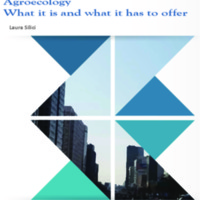Agroecology : What it is and what it has to offer
Dublin Core
Description
Agroecological farming is coming of age. Once the exclusive domain of food sovereignty and ecology movements, it has begun to be promoted enthusiastically in both developed and developing countries by non-government organisations, international development organisations and others seeking more sustainable food production and consumption systems. Though difficult to quantify, a growing body of anecdotal evidence and small-scale studies highlights the environmental and social benefits that these practices can bring. For example, a review of 40 initiatives employing different agroecological practices showed an average crop yield increase of 113%, in addition to environmental benefits such as carbon sequestration, reduction in pesticide use despite the fact that agroecological practices can
bring resilience and broad-based productivity to rural
communities and provide important ecosystem services
across the landscape, they are still not being widely
promoted in agricultural policies or by agricultural
research organisations in developed nor developing
countries, nor scaled-up at a significant level. This
paper asks why, tracing the multiple interpretations of
agroecology: what it means to different people and
how it is used. It lists the benefits and challenges of
agroecological practices and how they compare with
input-intensive, large-scale farming. Finally, it asks what
more needs to be done to mainstream agroecology
more widely in agricultural policies and practices?
bring resilience and broad-based productivity to rural
communities and provide important ecosystem services
across the landscape, they are still not being widely
promoted in agricultural policies or by agricultural
research organisations in developed nor developing
countries, nor scaled-up at a significant level. This
paper asks why, tracing the multiple interpretations of
agroecology: what it means to different people and
how it is used. It lists the benefits and challenges of
agroecological practices and how they compare with
input-intensive, large-scale farming. Finally, it asks what
more needs to be done to mainstream agroecology
more widely in agricultural policies and practices?
Creator
Source
www.pubs.iied.org/pdfs/14629IIED.pdf
Publisher
Contributor
Rahmah Agustira
Rights
Creative Commons
Type
Files
Citation
Laura Silici, “Agroecology : What it is and what it has to offer,” Open Educational Resources (OER) , accessed March 1, 2026, https://oer.uinsyahada.ac.id/items/show/184.


